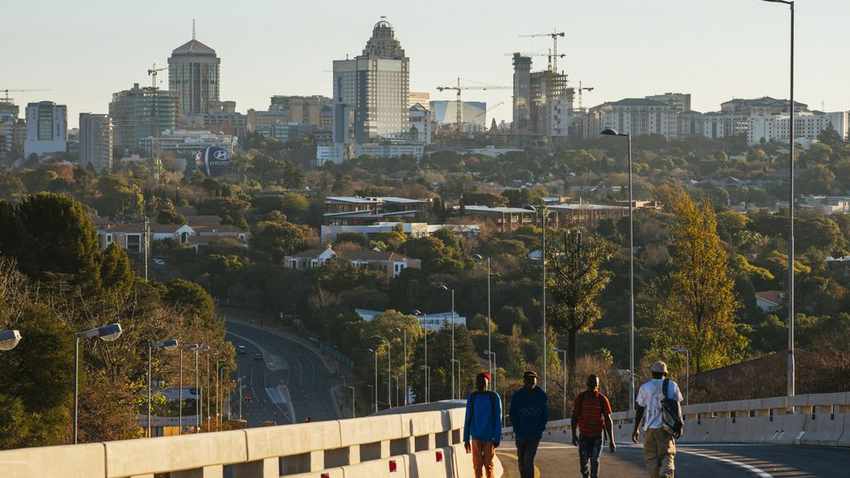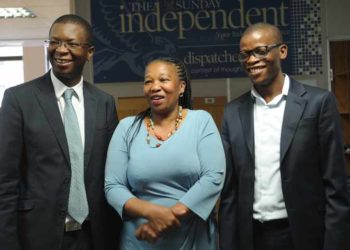JOHANNESBURG – Players in the Black-owned businesses space in South Africa, on top of the tremendous challenges they have faced since the start of the Covid-19 pandemic have revealed that many businesses associated with their organisations have been forced to shut down, leaving scores of workers unemployed despite the National Treasury and South African Reserve Bank (SARB) providing R200 billion in relief funds to banks to support them.
Black empowerment and business groupings as well as civil society organisations are now blaming SA’s banking sector for being racially selective in terms of distributing the relief funds and are accused of being responsible for the collapse of several black-owned businesses across the country.
At the start of the pandemic, SARB and National Treasury signed an agreement with individual banks to make available a total of R100 billion for the Covid-19 loan guarantee fund, and later announced that the scheme could be extended to R200 billion, if required.
Commercial banks represented by the Banking Association of South Africa (BASA) which had access to the guarantee scheme through SARB, and who were responsible for the distribution of the relief funds included Absa, Bidvest Bank, First National Bank, Grindrod Bank, Investec, Mercantile Bank, Nedbank, SASFIN Bank and Standard Bank.
The scheme was meant to provide loans, substantially guaranteed by the government, to eligible businesses to assist them during the pandemic. Funds borrowed from this scheme, through the banking industry, could be used for operational expenses, such as salaries, rent and lease agreements and contracts with suppliers, National Treasury said in a statement.
The National African Federated Chamber of Commerce and Industry (Nafcoc) had raised concern that a staggering 75% had been allocated to only white owned businesses. Nafcoc’s acting president Gilbert Mosena said this was a serious transgression coming from SA banks towards black-owned businesses.
He explained that the banks were not helping needy black-owned businesses with information on how to apply for the loan during this time of need.
“This was a sign that they did not want to assist black businesses. Banks advertise their products all the time. Why then were these loan schemes not publicized in all languages, and reached in the townships who hold small business?”
He said this had affected spaza shops, hawkers, fast food dealers, construction, tourism and industrial sectors, whose owners did not have access to information, and added that some businesses did not meet the criteria for the relief funds.
“However, the number of businesses that did qualify for spaza shop funding had very little knowledge of the offer because it was not widely spread and did not reach grass root level during the lockdown,” he added.
Black Business Council (BBC)’s Kganki Matabane said most black businesses did not bother to apply as they assumed that they would be rejected.
“One of the criteria was that businesses must be in good standing with the banks. We all know that big business and the government pay SMMEs late, if at all, so many SMMEs are not in good standing with the banks. It is a vicious circle for SMMEs,” said Matabane.
EFF spokesperson, Vuyani Pambo, said the Covid-19 stimulus package was used to protect and bolster the interests of white businesses.
He explained that the loan guarantee was conceived by ‘white people’, who were concerned that businesses that have been doing well and meeting their obligations with banks may not be able to do so.
“These were businesses that were functional and performing well and were able to access loans through banks and were mostly white owned businesses.
“The framing of this was misguided and equally misleading. Two issues we must discuss are why were state development finance institutions not the one mandated to distribute the R200 billion?
“And secondly, why did the state not impose requirements which include transformative requirements on banks of the state, if they are going to guarantee the R200 billion,” he asked.
Sizwe Ngqame, president of the Black Businesses Chamber said that the relief funds went back to the same people who have a bad history of being ignorant and not willing to economically transform the country.
“Most of the donations came from white wealthy families and maybe this is the reason why white-owned businesses were preferred entities,” he said.
Adil Nchabeleng, president of Transform RSA (TRSA) stressed that by refusing to avail funding to black businesses, the banking sector has ensured that a lot of black companies closed, and in the process, a lot of jobs were lost, thus worsening the crisis of black poverty.
“In a country with more than 30% unemployment, it is unacceptable that the government has not tried to hold the banking industry accountable for their racist attitude towards black businesses.
“We are building momentum towards a #occupybanks march and on that day, we will make a run on the banks and occupy them for a week. We are serious when we say racist banks must fall,” he said.
While FNB referred Independent Media to SARB for questions, Absa spokesperson Ingé Lamprecht distanced the bank from allegations of discriminating in allocating the relief fund to needy businesses.
She said by July 31, the bank had approved over R1.3 billion worth of funds to 20 000 qualifying businesses and that the general rules of who qualified for the scheme were determined by the government.
“Absa assesses each customer’s request for support based purely on their financial strength (most importantly their repayment or debt servicing ability), standing and track record with the bank. We do not consider race in the vetting process,” said Lamprecht.
“When asked to comment on Nafcoc’s allegations that 75% of the scheme was allocated to white business, the bank said “We have no idea where that comes from.”
Other banks approached for comment had not responded by the time of publication.
However, BASA’s Naledi Sekoati said 35% of the 42 000 applications for financial relief had been rejected by various banks as they did not meet the treasury and SARB risk criteria.
“The main reasons for the rejections was that the businesses were not in ‘good standing’ or the requested loan value was too high and the repayments unaffordable for the business.
“Since August 29 banks had provided R48,04 billion in relief funds, R33,49 billion in payment breaks and R14,54 billion under the loan guarantee scheme businesses, including small businesses and individuals who had been affected by the pandemic.”
SARB’s Thoraya Pandy stressed that the design of the scheme was negotiated between the banking sector and the National Treasury, with SARB only playing a role in administration.
“The risk was shared between banks and the National Treasury. Taken together with other relief measures provided by banks, the support provided to the economy and to bank customers has been significant.
“The SARB has lowered interest rates and provided regulatory relief to enable these support measures. The loan guarantee scheme’s initial take up was slower than anticipated.
“Key reasons include the banks own loan restructuring efforts, weak demand for credit and heightened uncertainty about future economic prospects (which discourage firms from taking on more debt).
“In responding to such a crisis, regulators have to balance the need to expand lending to support the economy with the need to ensure financial stability and to minimise the likelihood of bank failures. Our view is that the sector and the regulatory framework is adequately meeting that balance,” she added.
Pandy refused to respond to allegations made by the Nafcoc regarding the racial distribution of the relief fund. Questions have been sent to the National Treasury which has yet to comment.
BUSINESS REPORT


















